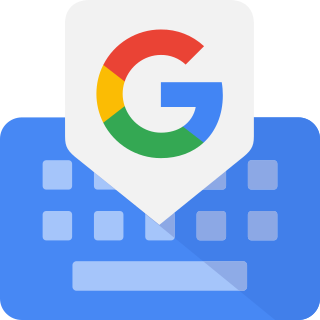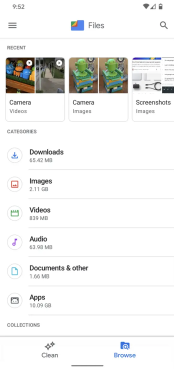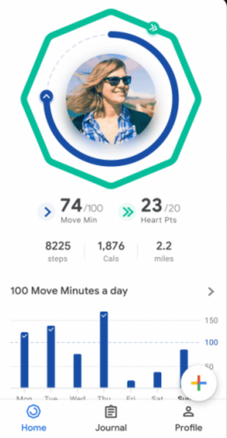
Google Calendar is a time-management and scheduling calendar service developed by Google. It was created by Mike Samuel as part of his 20% project at Google. It became available in beta release April 13, 2006, and in general release in July 2009, on the web and as mobile apps for the Android and iOS platforms.
Fitbit is a line of wireless-enabled wearable technology, physical fitness monitors and activity trackers such as smartwatches, pedometers and monitors for heart rate, quality of sleep, and stairs climbed as well as related software. It operated as an American consumer electronics and fitness company from 2007 to 2021.

Google Contacts is a contact management service developed by Google. It is available as an Android mobile app, a web app, or on the sidebar of Gmail as part of Google Workspace.

Google Play, also known as the Google Play Store or Play Store and formerly Android Market, is a digital distribution service operated and developed by Google. It serves as the official app store for certified devices running on the Android operating system and its derivatives, as well as ChromeOS, allowing users to browse and download applications developed with the Android software development kit (SDK) and published through Google. Google Play has also served as a digital media store, offering games, music, books, movies, and television programs. Content that has been purchased on Google Play Movies & TV and Google Play Books can be accessed on a web browser and through the Android and iOS apps.

Google Keep is a note-taking service included as part of the free, web-based Google Docs Editors suite offered by Google. The service also includes: Google Docs, Google Sheets, Google Slides, Google Drawings, Google Forms and Google Sites. Google Keep is available as a web application as well as mobile app for Android and iOS. The app offers a variety of tools for taking notes, including texts, lists, images, and audio. Text from images can be extracted using optical character recognition and voice recordings can be transcribed. The interface allows for a single-column view or a multi-column view. Notes can be color-coded and labels can be applied to notes to categorize them. Later updates have added functionality to pin notes and to collaborate on notes with other Keep users in real-time.

Google Hangouts was a cross-platform instant messaging service developed by Google. It originally was a feature of Google+, becoming a standalone product in 2013, when Google also began integrating features from Google+ Messenger and Google Talk into Hangouts. Google then began integrating features of Google Voice, its Internet telephony product, into Hangouts, stating that Hangouts was designed to be "the future" of Voice.
Google Play Services is a proprietary software package produced by Google for installation on Android devices. It consists of background services and libraries for use by mobile apps running on the device. When it was introduced in 2012, it provided access to the Google+ APIs and OAuth 2.0. It expanded to cover a variety of Google services, allowing applications to communicate with the services through common means.

Wear OS is a version of Google's Android operating system designed for smartwatches and other wearables. By pairing with mobile phones running Android version 6.0 "Marshmallow" or newer, or iOS version 10.0 or newer with limited support from Google's pairing application, Wear OS integrates Google Assistant technology and mobile notifications into a smartwatch form factor. Wear OS is closed-source, in contrast to the free and open-source Android.

Health is a health informatics mobile app, announced by Apple Inc. on June 2, 2014, at its Worldwide Developers Conference (WWDC). The app is available on iPhone and iPod Touch devices running iOS 8 or later, and on iPads running iPadOS 17 or later. The application holds health data such as blood pressure measurement and glucose levels, but also holds physical tracking data such as step counts. It can pull data from fitness trackers, smartwatches, smart scales, and other devices.

Google Photos is a photo sharing and storage service developed by Google. It was announced in May 2015 and spun off from Google+, the company's former social network.

Gboard is a virtual keyboard app developed by Google for Android and iOS devices. It was first released on iOS in May 2016, followed by a release on Android in December 2016, debuting as a major update to the already-established Google Keyboard app on Android.

Google Allo was an instant messaging mobile app by Google for the Android and iOS mobile operating systems, with a web client available in some web browsers. It closed on March 12, 2019.

Fuchsia is an open-source capability-based operating system developed by Google. In contrast to Google's Linux-based operating systems such as ChromeOS and Android, Fuchsia is based on a custom kernel named Zircon. It publicly debuted as a self-hosted git repository in August 2016 without any official corporate announcement. After years of development, its official product launch was in 2021 on the first-generation Google Nest Hub, replacing its original Linux-based Cast OS.

Google Lens is an image recognition technology developed by Google, designed to bring up relevant information related to objects it identifies using visual analysis based on a neural network. First announced during Google I/O 2017, it was first provided as a standalone app, later being integrated into Google Camera but was reportedly removed in October 2022. It has also been integrated with the Google Photos and Google Assistant app and with Bard as of 2023.

Files is a file management app developed by Google for file browsing, media consumption, storage clean-up and offline file transfer. It was released by Google on December 5, 2017 with a custom version for China being released on May 30, 2018.

Android 10 is the tenth major release and the 17th version of the Android mobile operating system. It was first released as a developer preview on March 13, 2019, and was released publicly on September 3, 2019.

GrapheneOS is an Android-based, open source, privacy and security-focused mobile operating system for selected Google Pixel devices, including smartphones, tablets and foldables that is recommended by Edward Snowden.

The Pixel Watch is a Wear OS smartwatch designed, developed, and marketed by Google as part of the Google Pixel product line. First previewed in May 2022 during the Google I/O keynote, it features a round dome-shaped display as well as deep integration with Fitbit, which Google acquired in 2021. Two Pixel-branded smartwatches had been in development at Google by July 2016, but were canceled ahead of their release due to hardware chief Rick Osterloh's concerns that they did not fit well with other Pixel devices. Development on a new Pixel-branded watch began shortly after Google's acquisition of Fitbit.










